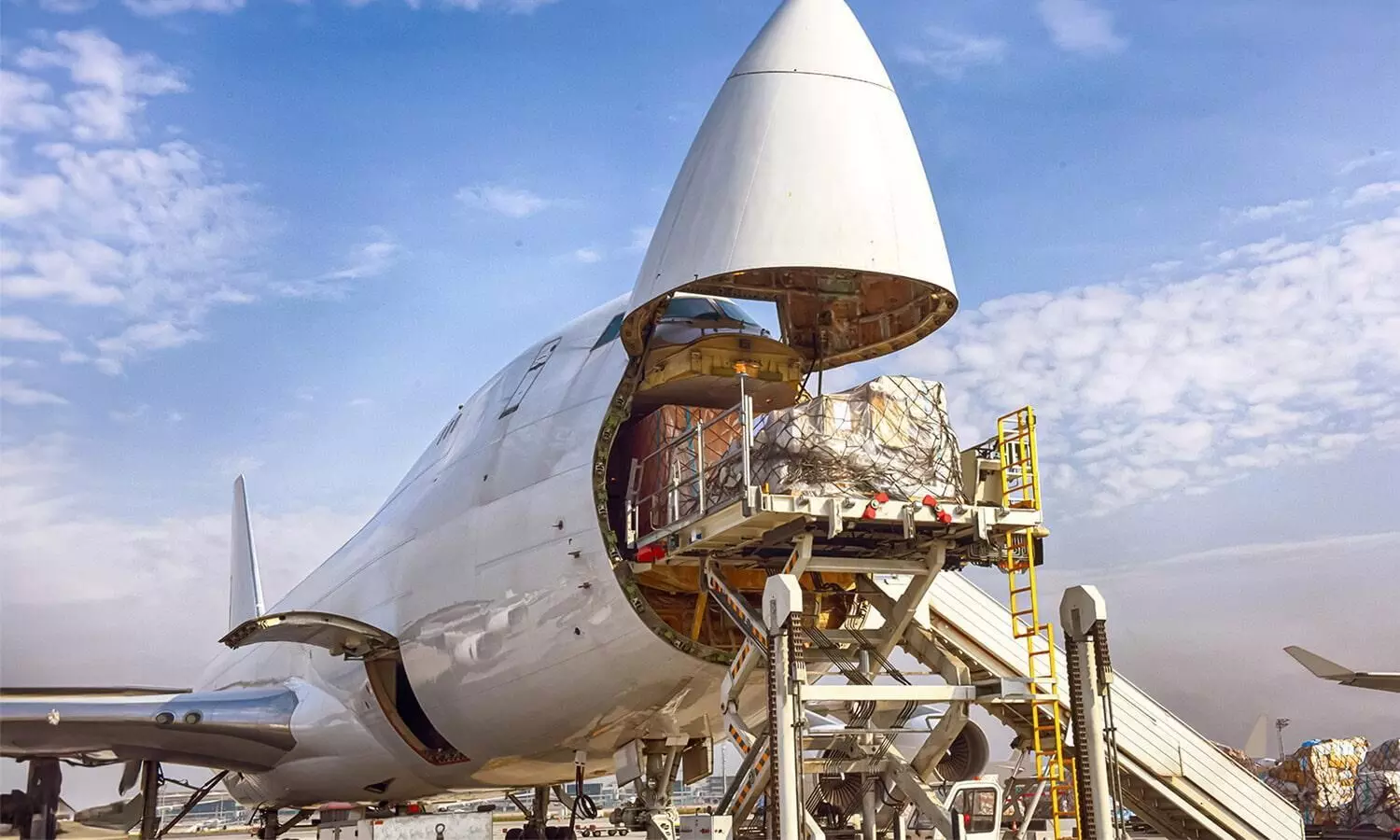
How e-commerce boom is reshaping the cargo charter industry

Image Source: Air Partner
The impact of e-commerce on the air cargo charter industry has been profound, especially over the past couple of years. The need for rapid delivery of products ordered online has led to a substantial increase in demand for air freight services.
The global cargo charter sector is undergoing a significant transformation, driven largely by the explosive growth in e-commerce. As online shopping continues to surge worldwide, it's reshaping not just consumer behaviour but the entire logistics landscape. This shift is particularly evident in the air cargo sector. The impact of e-commerce on the air cargo charter industry has been profound, especially over the past couple of years. The need for rapid delivery of products ordered online has led to a substantial increase in demand for air freight services.
Leonard Rodrigues, Director of Revenue Management & Network Planning, Etihad Cargo, provided insight into this growth, highlighting the contrast between traditional cargo and e-commerce-driven demand: "The e-commerce boom, which significantly accelerated in the second half of 2023, has had a significant impact on the demand for air cargo charters. Traditional verticals, which exclude e-commerce, have witnessed modest year-over-year growth of around 2%, while total demand, including e-commerce, has surged by approximately 9% due to the explosive growth of this sector."
The biggest opportunities for air-cargo will be to find the right freighter for the right market at the right-time to cater for the demand for e-commerce.
-Sanjeev Gadhia of Astral Aviation
Astral Aviation has also seen significant growth in e-commerce volumes from Hong Kong to the Middle East and Africa, leveraging its Boeing 767 freighter—a mid-size aircraft ideal for frequent e-commerce shipments to these regions. In August 2024, Astral launched direct flights between Guangzhou (China) and Nairobi (Africa) as Guangzhou is a vital gateway for Chinese goods, including electronics and e-commerce products.
This surge in demand has had far-reaching effects on pricing strategies and capacity management within the industry. Charter operators have had to adapt quickly, adjusting their pricing models and refining their capacity management approaches to meet fluctuating demand. Rodrigues further explained Etihad Cargo's strategy, emphasising the delicate balance between supporting long-term clients and accommodating the e-commerce sector. He stated, "Etihad Cargo has prioritised maintaining long-term relationships with traditional customers while supporting e-commerce requirements through diversification of loads and strategic capacity allocation. This ensures that our partners handling both traditional and e-commerce goods receive the necessary support while also managing the pricing dynamics to avoid forcing higher pricing onto long-term clients who cannot match the rates set by e-commerce-driven demand."
The e-commerce boom has created both challenges and opportunities for the air cargo charter industry. One of the most pressing issues is the availability of charter aircraft, particularly during peak seasons such as holidays and major shopping events. Pierre Van Der Stichele, Vice President of Global Cargo, Air Partner, highlighted this challenge, pointing out the specific routes and aircraft types most affected by the surge in demand. "Long haul demand from Asia to the USA and Europe is very strong at this time predominantly for e-commerce. So much so that chartering a B767-300, B747F and B777F with suitable long range has become short in supply, unless given significant notice (3-4 weeks),” he mentioned.
This scarcity of aircraft has led to increased competition and higher prices, especially during peak seasons. Van Der Stichele of Air Partner predicted a challenging landscape for the upcoming peak season, emphasising the need for early planning and the likelihood of price increases. "The peak season will be better than 2023 and we may suffer from a lack of wide body long range freighter availability in regular peak season traffic due to predominantly e-commerce companies swallowing the capacity. What this means for charters is that price will increase and more lead time will be required for wide body freighters for the October to December period,” he forecasted.
E-commerce is only going to grow, it's a matter of how fast. As e-commerce giants control a large percentage of market capacity, being able to navigate the volatility will be the biggest challenge
-Jon Corbi of Air Partner
Richard Broekman, Chief Commercial Officer and Head of Sustainability, Atlas Air, highlighted the challenges ahead for the air cargo market as peak season approaches. He noted, “We already observed a strong recovery in the market during the peak of 2023, following a downturn earlier in the year. For the current year, we anticipate an even stronger peak, with most capacity already contracted by key players. There may be limited capacity left to accommodate additional peak demand expected from September through December. This will make for a challenging peak season for both general market shippers and e-commerce companies to access capacity."
The challenges extend beyond aircraft availability. Sanjeev Gadhia, CEO of Astral Aviation, pointed out another significant issue related to the types of aircraft available in the market, highlighting the mismatch between current fleet compositions and the demands of e-commerce. "Main challenges facing the industry is the lack of converted aircrafts notably the A330-300F and B777-200 and 300 family which is resulting in high demand for existing freighters notably the B747F and B767F which cannot cope with the high demand for e-commerce,” he added.
Hopefully e-commerce will give the cargo market a steadier trajectory – too often cargo goes from boom to bust very fast. Let's hope e-commerce doesn't follow that trend
-Dan Morgan-Evans of Air Charter Service
Gadhia of Astral Aviation also highlighted geopolitical factors affecting the industry, drawing attention to the interplay between international trade disputes and the logistics of e-commerce shipments and mentioned, "Another challenge is the trade-war between China-US and Europe, which is affecting the tax classification for e-commerce shipments based on certain values that is resulting in customs delays and airport congestion."
Jon Corbi, Executive Vice President, Group Charter and Cargo, US, Air Partner, emphasised the ongoing growth of e-commerce and its implications, touching on the challenges of market volatility and the potential impact on carriers: "E-commerce is only going to grow, it's a matter of how fast. As e-commerce giants control a large percentage of market capacity, being able to navigate the volatility will be the biggest challenge. E-commerce yields famously low margins, so the question is: will the operators be able to survive the low seasons? We've already seen scheduled cargo carriers cut routes and capacity which makes the need for charters greater than ever."
Despite these challenges, the e-commerce boom also presents significant opportunities for innovation in fleet management and the development of specialised e-commerce air freight solutions. Dan Morgan-Evans, Group Cargo Director, Air Charter Service (ACS), highlighted the potential in long-term planning stating, "There are opportunities to book long-term charter programmes for e-commerce but also, with the rise in volumes, it is creating opportunities for charters in other sectors."
Corbi of Air Partner, pointing out the potential for disruption in the market and how it can benefit charter operators, mentioned, "Aircraft are available, but they are not cheap. I don't think we'll see peak Covid rates, but with the e-commerce boom, port strikes, and elections around the globe there will be disruption – and disruption is great for the charter market!"
The increasing air traffic due to e-commerce growth has also put pressure on the industry to address its environmental impact. Many companies are investing in fuel-efficient aircraft, exploring alternative fuels, and optimising flight routes to reduce emissions. Qatar Airways Cargo was announced as the launch customer of Boeing's next-generation 777-8F freighter in 2022, renowned for its fuel efficiency and eco-friendliness.
Etihad Cargo, known for its modern and fuel-efficient fleet, is further expanding its capacity with an order for seven A350 freighters. These new aircraft are scheduled to join the fleet starting in late 2026.
Rodrigues of Etihad Cargo commented on this trend, highlighting how the stability brought by e-commerce is enabling long-term fleet planning and sustainability initiatives. "The stability in demand brought by the e-commerce boom has made it more feasible for companies to justify renewing their fleets. This shift towards modern, efficient fleets is essential for balancing the growth in air traffic due to e-commerce with the need to reduce the industry's carbon footprint,” he added.
Looking ahead, the e-commerce boom continues to present significant opportunities for the air cargo charter industry. Gadhia of Astral Aviation, emphasising the need for strategic fleet management and cost-effective transport solutions in the future, stated, "The biggest opportunities for air-cargo will be to find the right freighter for the right market at the right-time to cater for the demand for e-commerce. Due to the high costs for air-cargo, the industry will need to explore alternate forms of low-cost transport such as Sea-Air as the current spikes in rates cannot be sustained in the long term."
Broekman of Atlas Air, addressing the impact of e-commerce growth on air cargo capacity, stated, “As e-commerce continues to expand, the lack of available capacity—whether due to constraints at aircraft manufacturers or the slow conversion of passenger aircraft into freighters—will put the industry in a favorable position."
Morgan-Evans of ACS, expressing hope for a more stable future, added, "Hopefully e-commerce will give the cargo market a steadier trajectory – too often cargo goes from boom to bust very fast. Let's hope e-commerce doesn't follow that trend."
To sum it up, the e-commerce boom has transformed the air cargo charter industry, presenting both challenges and opportunities. The surge in online shopping has increased demand for air cargo charters and affected pricing and capacity strategies. Companies that can effectively balance the increasing demand with operational efficiency and sustainability are likely to thrive in this evolving landscape.
This was originally published in the September 2024 issue of The STAT Trade Times.

